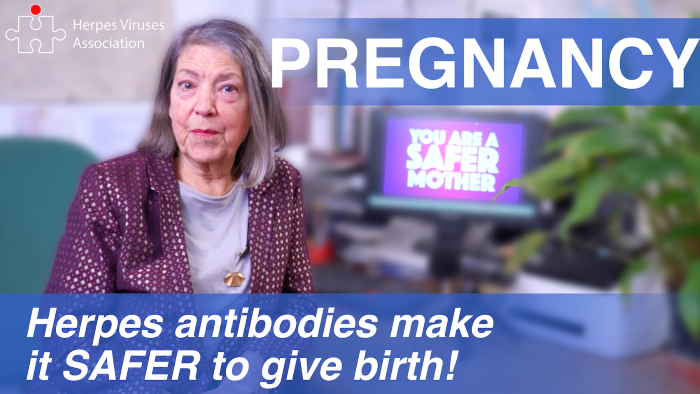Getting pregnant when you have genital herpes
Having genital herpes does not affect fertility or the ability to get pregnant. And there is no issue if during pregnancy genital herpes recurs – in fact this is common. Talk to your doctor about taking antiviral tablets if you need to prevent outbreaks when you want to conceive. This is safe.
Click on: Pregnancy and childbirth

Genital herpes and early pregnancy – first and second trimester
Having a primary infection of genital herpes (catching herpes in early pregnancy) at this time will not affect the baby or cause a miscarriage. We now know there is no evidence for herpes causing a miscarriage when a mother catches genital herpes in the first three months – although we used to think that there was an increased risk. Catching herpes will not cause miscarriage.
Having outbreaks during pregnancy is normal. These recurrences will not harm the baby. Some women have more outbreaks during pregnancy. You may choose to take aciclovir 400 mg three times daily from 32nd week of pregnancy to ensure you don’t have an outbreak at term.
Childbirth with genital herpes – you can have a normal delivery with genital herpes
If you have caught genital herpes before becoming pregnant you can expect to give birth normally (vaginally). This is stated in the guideline from the Royal College of Obstetrics and Gynaecology together with the British Association for Sexual Health and HIV: BASHH and RCOG: Management of Genital Herpes in Pregnancy. 2024 – we were on the team that reviewed this guideline. [And you can see the patient-friendly version here.]
If you wish, you can take aciclovir 400 mg three times daily from 32 weeks on, to ensure you don’t have an outbreak during the birth.
Why it is OK to have a normal delivery even when there is an outbreak of herpes?
Towards the end of pregnancy, babies in the womb receive antibodies to all the infections that their mothers have previously caught. These antibodies protect the baby from catching these viruses during childbirth and afterwards, longer when the mother breast feeds. After that, this protection fades away.
Common sense tells us: since humans began, women with cold sores have kissed their new babies – repeatedly. No one worries that their babies will catch herpes and be affected. The baby of a woman with a genital infection might briefly touch the ‘cold sore’ on her genitals on its way into the world – once. See ‘Neonatal herpes’ in the section below for when babies can have a problem.
A personal experience of herpes simplex
“My second experience of delivering a baby when you have a history of herpes was so different! First time round it was ‘You will need a C-section if you have a recurrence.’ Luckily I didn’t have a recurrence, but I spent the last weeks of pregnancy checking myself diligently and dreading find a herpes sore… This time, the midwife was so reassuring: as long as I made it to full-term, herpes would not be a factor in my delivery, she said, because I would have passed my antibodies to the baby. What a relief not to be worrying like last time. I should add that there was 8 years between these two pregnancies. I guess the guideline for giving birth with herpes has changed in that time.”
When can herpes simplex cause problems in pregnancy?
During pregnancy, genital herpes simplex only causes concern:
- If the mother has a first infection during the last few months of pregnancy because there may not be time for the baby to acquire antibodies from the mother before the birth. Taking aciclovir 400 mg three times daily will probably be prescribed by your obstetrician and may prevent the need for a C-section.
- If baby is being born before 32 weeks (very premature). These babies do not have full antibody protection so they could be infected during the birth if the mother has sores.
In these cases, there is a danger that the baby could contract herpes simplex so a Caesarean-section is usually performed. Women who do not have genital herpes should be careful not to catch it in the last two months of pregnancy – as explained above. This means that if their partners are already infected (facially or genitally) they should avoid contact that might transmit the virus to the mother.
A referenced “Pregnancy and Childbirth” leaflet is available to subscribers.
What is neonatal herpes?
Neonatal herpes
If a baby under 1 month old develops herpes simplex, we call it neonatal herpes. This is very rare, and usually this is because the mother does not have herpes simplex herself, so the baby has no antibodies. Because it is so uncommon, it gets written about!
The NHS Choices website has more about babies with herpes.
Can I pass genital herpes on to a baby or toddler?
A person with genital sores who is looking after a baby or toddler will never infect the child. Read more. It is passed on by direct skin contact with the affected place, so as long as the child does not come into contact with naked genitals, it cannot be passed on.
Small babies can be susceptible to viruses. Don’t kiss other people’s babies when you have a cold sore on the face.
Why don't they screen all pregnant people for herpes?
Because the risk of a baby being affected by herpes simplex is so very low, they would have to screen 4,000 women in order to prevent one baby from catching it. This is would not be practicable.
More questions and answers
- Getting diagnosed with genital herpes
- About herpes simplex virus
- Antibody tests for herpes
- Passing on/transmitting herpes
- Herpes recurrences explained
- Treating genital herpes
- Other herpes questions
Tell us what you think of this website. Just a few questions
The best way to help us is with a donation! We rely on readers donations to continue our work.
Our helpline volunteers can answer your questions about herpes
Phone the helpline on 0345 123 2305, or email us at [email protected]
This page was updated on 4-9-2025




